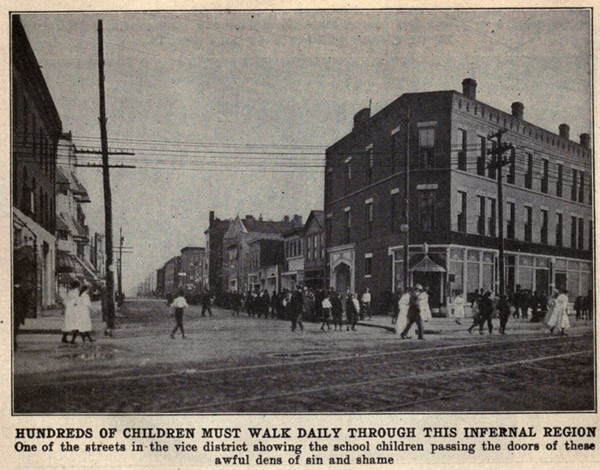
1. Calumet 412 dug up two spectacular maps of "every brothel, bar, casino and saloon that existed in the Cheyenne and Levee Districts of Chicago between 1870 and 1905." (Actually, the first is from 1870 and 1905, the second is from 1895-1923, per My Al Capone Museum). The density of sin there is really just extraordinary. Almost every structure in each district housed, at some point, one of the above.
2. Via Coudal, a 1900 piece on the saloons of Chicago. Some of the pleasures to be found therein were much more simple than you'd expect, and are just as true today:
A function, which should rightly be a civic one, the saloon has appropriated, and added to the long list of the necessities to which it ministers—that of furnishing to the people the only toilet conveniences in large sections of the city. In this respect the ordinary hotel is not better equipped than are the saloons. Moreover, either by their clerks or by signs, the hotels inform the man who habitually takes advantage of them that they are not for the use of the general public. We are behind European municipalities in this respect, and Chicago is especially deficient. Here is a field awaiting the efforts of some public-spirited man, a service by no means small, and one that would directly affect the liquor interests. Not that it will cause any man to cease drinking, but that it will remove a temptation from thousands of men who, of necessity, daily pass the bar which they feel under obligation to patronize. Nor will it longer necessitate the familiarizing of little boys with the evils of saloon life. Such are a few of the attractions which the saloon in the workingmen’s district offer to its patrons.
I'm fine with prohibitionary arguments for public restrooms.
It's a pretty great piece, sort of a very early neoliberal search for "saloon substitutes" to fight the scourge of liquor instead of full-on prohibition. In short, a charming and totally futile effort to figure out why people go to saloons instead of drinking and what synthetic creation could replace them. Hence the idea that we should look to European cities and their admirable density of public toilets to prevent innocent men with full bladders from falling to the temptations of devil whiskey.
Also: not enough parks lead boys to sin (there is no new public-planning dilemma under the sun):
But the young man, where does he spend his evenings? Leaving the supper table he takes his hat and sets out from home, to go where? Let us follow the boy in the crowded districts—in the river wards of Chicago. As he comes out of the house into the street he is surrounded for miles with brick and mortar; not a blade of grass or a leaf of green to be seen. Placing his fingers to his mouth he gives a shrill whistle, which is answered by one and another of the boys, till the little crowd—their club—has gathered…. Driven about the streets like dogs by the civil authorities (whether it be necessary I am not now discussing); provided with no place for the healthy exercise of their physical natures, or even an opportunity to meet and tell stories, they have recourse to but one of two alternatives: to dodge the police, hiding in underground caves and under sidewalks until they become hardened against the law; or to enter the places the saloon has provided for them.
And as the earliest fast-food joints (I didn't know the term "red hots" was that old):
For the large floating population of these districts, and for the thousands of men whose only home is in the street or the cheap lodging-house, where they are herded together like cattle, the saloon is practically the basis of food supply. The table shows that 68 per cent. furnish free lunches, and 15 per cent. business lunches. On the free-lunch counters are dishes containing bread, several kinds of meats, vegetables, cheeses, etc., to which the men freely help themselves. Red-hots (Frankfurters), clams, and egg sandwiches are dispensed with equal freedom to those who drink and to those who do not.
And of course a place to be dumb (but sociologically and politically significant) yokels:
In some communities no obscene word is uttered, and but little that is suggestive of evil is presented. It affords an opportunity for the hard-worked men and women to escape from their stuffy homes and thoughts of poverty into a clean, well-lighted room, where with their families they canenjoy an evening of pleasure. To see the hardened, careworn expressions on their faces gradually relax and melt away into expressions of simple enjoyment, as they laugh heartily at the jokes, might at first arouse one’s sense of humor, but it would soon impress one deeply with the pathos of it all: with the thought that this little entertainment, cheap and vulgar as it is, seems to satisfy their longing for amusement…. The sense of the masses on the Cuban war policy could easily be determined by their applause and hisses at the saloon vaudevilles.
Up until the turn of the century they were also places to go and not get pestered by sociologists, but my alma mater (PDF) sort of ruined that.
Photograph: From Fighing the Traffic in Young Girls, or, War on the white slave trade



